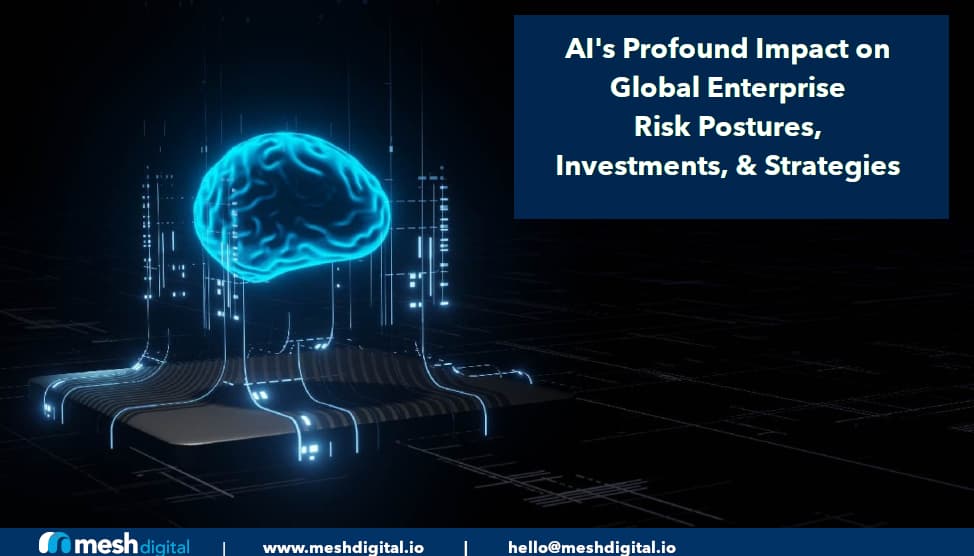AI's Impact on Risk Management: Transforming Global Enterprises' Risk Posture, Investments, and Strategies
AI is rapidly reshaping industries and business practices, and its impact on risk management is no exception. This article explores the profound implications of AI on risk management practices.

Introduction
Artificial Intelligence (AI) is rapidly reshaping industries and business practices, and its impact on risk management is no exception. Global enterprises are increasingly recognizing AI's potential to revolutionize the way they manage risks, make investment decisions, and formulate strategies. This article explores the profound implications of AI on risk management practices, delving into its influence on risk posture, investment strategies, and strategic decision-making for global enterprises.
Enhancing Risk Posture with AI-driven Insights
AI's capabilities in processing vast volumes of data and identifying patterns in real-time have redefined risk management practices. The integration of AI-powered risk analytics empowers global enterprises to enhance their risk posture in several key ways:
a. Real-time Risk Monitoring: AI algorithms continuously monitor diverse data sources, such as social media, news articles, and financial markets, enabling early identification of potential risks. Real-time monitoring allows organizations to respond quickly to emerging threats and seize opportunities promptly.
b. Predictive Risk Modeling: AI-driven predictive modeling enables organizations to forecast future risks and assess their potential impacts. By anticipating risks, enterprises can proactively allocate resources and implement risk mitigation strategies before they escalate.
c. Early Warning Systems: AI's data analysis capabilities facilitate the development of early warning systems that detect deviations from baseline patterns, alerting organizations’ security teams to potential risks. Timely alerts enable swift actions to prevent or mitigate adverse outcomes.
d. Fraud Detection and Prevention: AI-powered risk management systems can identify anomalies and patterns indicative of fraudulent activities, safeguarding enterprises against financial losses and reputational damage.
Optimizing Investments with AI-driven Decision Support
AI significantly enhances the precision and efficiency of investment decision-making for global enterprises:
a. Data-driven Investment Strategies: AI algorithms analyze historical market data, economic indicators, and company performance metrics to generate data-driven investment strategies. This enables enterprises to optimize their investment portfolios and maximize returns while managing risk exposure.
b. Sentiment Analysis: AI processes unstructured data, such as social media sentiment, news articles, and customer feedback, to gauge market sentiment and investor perceptions. This valuable insight supports informed investment decisions.
c. Risk-adjusted Portfolio Management: AI performs real-time risk assessments on investment portfolios, enabling enterprises to adjust allocations based on risk appetite and market conditions. This approach enhances portfolio diversification and risk-adjusted returns.
d. Algorithmic Trading: AI-powered algorithms facilitate algorithmic trading, where trades are executed based on pre-defined rules and market signals. This reduces human biases and emotions from investment decisions, leading to more disciplined and consistent trading strategies.
Formulating Effective Strategies with AI-powered Insights
AI augments a global enterprises' strategic planning processes by providing valuable insights and foresight:
a. Market Intelligence and Trend Analysis: AI processes vast amounts of market data and consumer trends to identify emerging opportunities and potential threats. This intelligence informs strategic choices and enables organizations to capitalize on market trends.
b. Competitive Landscape Analysis: AI-driven competitive intelligence assists enterprises in understanding their competitors' actions, strengths, and weaknesses. This insight informs strategic positioning and enables organizations to develop competitive advantage, thus market differentiation.
c. Scenario Planning and Risk Simulations: AI simulates various scenarios based on different market conditions and risks. These simulations help organizations assess the resilience of their strategies and make more robust strategic decisions.
d. Personalized Customer Strategies: AI-powered analytics enables enterprises to understand customer behavior and preferences on an individual level. This information drives personalized marketing and customer engagement strategies, fostering loyalty and retention.
Conclusion
AI's impact on risk management is transforming global enterprises' approach to managing risks, making investment decisions, and formulating strategies. By leveraging AI-driven insights, organizations can enhance their risk posture, optimize investments, and make better informed strategic decisions. AI's real-time risk monitoring, predictive risk modeling, and early warning systems can enable proactive risk mitigation, while AI-powered decision support systems provide valuable market intelligence for informed investments.
As AI continues to advance, its role in revolutionizing risk management practices will become increasingly pivotal in shaping the future of business growth and resilience. Embracing AI in risk management is no longer a luxury but a necessity for global enterprises seeking to gain a competitive edge in today's dynamic business landscape.
References:
- Bhardwaj, G., Saha, S., & Singhal, V. (2019). Artificial Intelligence in Investment Management. Harvard Business Review. Retrieved from https://hbr.org/2019/01/artificial-intelligence-in-investment-management
- Flaherty, P., Heineke, J., Levens, M., & Strenger, C. (2020). Using Artificial Intelligence to Improve Business Outcomes. McKinsey & Company. Retrieved from https://www.mckinsey.com/business-functions/operations/our-insights/using-artificial-intelligence-to-improve-business-outcomes
- Garg, R., Kumar, V., & Kumar, A. (2021). AI and Strategy: A Powerful Combination. Forbes. Retrieved from https://www.forbes.com/sites/forbesbusinesscouncil/2021/04/27/ai-and-strategy-a-powerful-combination/?sh=235cf1c0618a
- May, T., & Albuja, S. (2021). Risk Management and Machine Learning. Deloitte. Retrieved from https://www2.deloitte.com/us/en/pages/deloitte-analytics/articles/risk-management-and-machine-learning.html
- Mehrotra, V., Raman, V., Sivakumar, V., & Varma, R. (2021). AI and Investment Decisions: A Comprehensive Approach. Gartner. Retrieved from https://www.gartner.com/en/documents/4018781/ai-and-investment-decisions-a-comprehensive-approach
- Siegel, J. (2019). How AI Can Improve Strategy. MIT Sloan Management Review. Retrieved from https://sloanreview.mit.edu/article/how-ai-can-improve-strategy/
